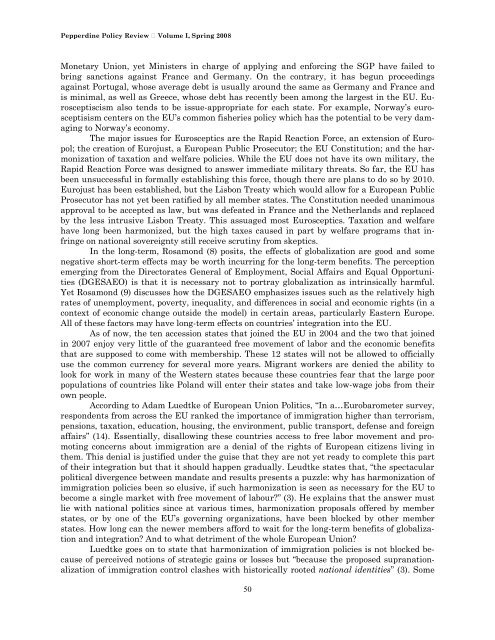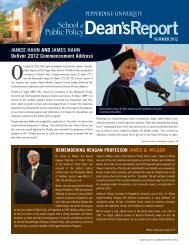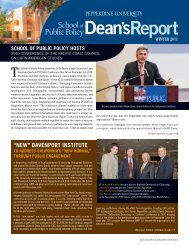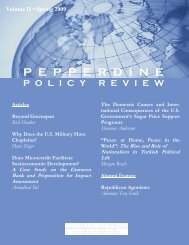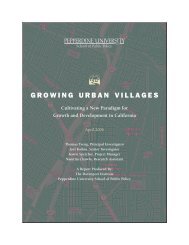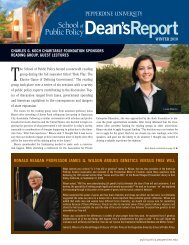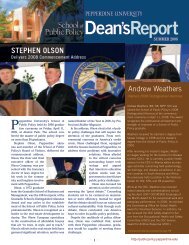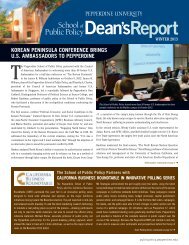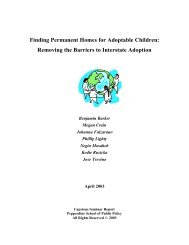Pepperdine University School of Public Policy
Pepperdine University School of Public Policy
Pepperdine University School of Public Policy
You also want an ePaper? Increase the reach of your titles
YUMPU automatically turns print PDFs into web optimized ePapers that Google loves.
<strong>Pepperdine</strong> <strong>Policy</strong> Review Volume I, Spring 2008<br />
Monetary Union, yet Ministers in charge <strong>of</strong> applying and enforcing the SGP have failed to<br />
bring sanctions against France and Germany. On the contrary, it has begun proceedings<br />
against Portugal, whose average debt is usually around the same as Germany and France and<br />
is minimal, as well as Greece, whose debt has recently been among the largest in the EU. Eurosceptiscism<br />
also tends to be issue-appropriate for each state. For example, Norway’s eurosceptisism<br />
centers on the EU’s common fisheries policy which has the potential to be very damaging<br />
to Norway’s economy.<br />
The major issues for Eurosceptics are the Rapid Reaction Force, an extension <strong>of</strong> Europol;<br />
the creation <strong>of</strong> Eurojust, a European <strong>Public</strong> Prosecutor; the EU Constitution; and the harmonization<br />
<strong>of</strong> taxation and welfare policies. While the EU does not have its own military, the<br />
Rapid Reaction Force was designed to answer immediate military threats. So far, the EU has<br />
been unsuccessful in formally establishing this force, though there are plans to do so by 2010.<br />
Eurojust has been established, but the Lisbon Treaty which would allow for a European <strong>Public</strong><br />
Prosecutor has not yet been ratified by all member states. The Constitution needed unanimous<br />
approval to be accepted as law, but was defeated in France and the Netherlands and replaced<br />
by the less intrusive Lisbon Treaty. This assuaged most Eurosceptics. Taxation and welfare<br />
have long been harmonized, but the high taxes caused in part by welfare programs that infringe<br />
on national sovereignty still receive scrutiny from skeptics.<br />
In the long-term, Rosamond (8) posits, the effects <strong>of</strong> globalization are good and some<br />
negative short-term effects may be worth incurring for the long-term benefits. The perception<br />
emerging from the Directorates General <strong>of</strong> Employment, Social Affairs and Equal Opportunities<br />
(DGESAEO) is that it is necessary not to portray globalization as intrinsically harmful.<br />
Yet Rosamond (9) discusses how the DGESAEO emphasizes issues such as the relatively high<br />
rates <strong>of</strong> unemployment, poverty, inequality, and differences in social and economic rights (in a<br />
context <strong>of</strong> economic change outside the model) in certain areas, particularly Eastern Europe.<br />
All <strong>of</strong> these factors may have long-term effects on countries’ integration into the EU.<br />
As <strong>of</strong> now, the ten accession states that joined the EU in 2004 and the two that joined<br />
in 2007 enjoy very little <strong>of</strong> the guaranteed free movement <strong>of</strong> labor and the economic benefits<br />
that are supposed to come with membership. These 12 states will not be allowed to <strong>of</strong>ficially<br />
use the common currency for several more years. Migrant workers are denied the ability to<br />
look for work in many <strong>of</strong> the Western states because these countries fear that the large poor<br />
populations <strong>of</strong> countries like Poland will enter their states and take low-wage jobs from their<br />
own people.<br />
According to Adam Luedtke <strong>of</strong> European Union Politics, “In a…Eurobarometer survey,<br />
respondents from across the EU ranked the importance <strong>of</strong> immigration higher than terrorism,<br />
pensions, taxation, education, housing, the environment, public transport, defense and foreign<br />
affairs” (14). Essentially, disallowing these countries access to free labor movement and promoting<br />
concerns about immigration are a denial <strong>of</strong> the rights <strong>of</strong> European citizens living in<br />
them. This denial is justified under the guise that they are not yet ready to complete this part<br />
<strong>of</strong> their integration but that it should happen gradually. Leudtke states that, “the spectacular<br />
political divergence between mandate and results presents a puzzle: why has harmonization <strong>of</strong><br />
immigration policies been so elusive, if such harmonization is seen as necessary for the EU to<br />
become a single market with free movement <strong>of</strong> labour?” (3). He explains that the answer must<br />
lie with national politics since at various times, harmonization proposals <strong>of</strong>fered by member<br />
states, or by one <strong>of</strong> the EU’s governing organizations, have been blocked by other member<br />
states. How long can the newer members afford to wait for the long-term benefits <strong>of</strong> globalization<br />
and integration? And to what detriment <strong>of</strong> the whole European Union?<br />
Luedtke goes on to state that harmonization <strong>of</strong> immigration policies is not blocked because<br />
<strong>of</strong> perceived notions <strong>of</strong> strategic gains or losses but “because the proposed supranationalization<br />
<strong>of</strong> immigration control clashes with historically rooted national identities” (3). Some<br />
50


